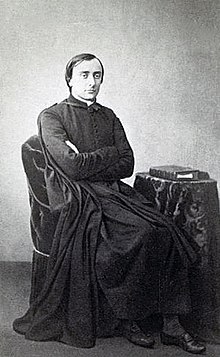CHAPTER 39
THE GREAT PERSIAN REVIVAL AND THE RUSSO-PERSIAN WAR
Persian troops in a trenchwork in Armenia, circa 1890
The Russian Empire was, by 1840, a superpower in its own right, slowly taming the independent kingdoms and lands of the Caucasus, exploring Alyaska in North America, and building an Imperial Army which could truly be feared by its neighbors. But the prestige gained could only do so much, as Nicholas I fell into ill health and the nation became embroiled in the English Revolution. Other nations were gaining new technologies and sciences and skills, while Russia mostly remained in the 18th century, little different than a century prior. At last, in 1855, Alexander II came to the throne with his consort Victoria of England. He was determined to modernize his nation and bring Westernized ways of thinking in to make sure his country was actually keeping up with potential enemies and garnering respect around the world.
It was around this same time that Persia witnessed the final destruction of the Ottoman Empire at the hands of Caesar Napoleon II and the collapse of the Islamic World. In 1860, the Afghanistan conflict broke out between French India and Afghanistan, which saw Afghanistan lose Kashmir. This served both as a warning and an opportunity for Persia. It's Shah, Naser al-Din, of the Qajar Dynasty, feared that Western powers would come for his country next, but also saw the chaos and disunity of the surrounding regions to his advantage. While the League of the Three Czars busied themselves dealing with Constantinople and minor disturbances in the Balkans, such as the failed military coup against Tsar Timotei I of Bulgaria in 1865, Persia was doing its best to move out of the Renaissance and into the 19th century. The state was almost bankrupt and civil unrest was high following the Turkish collapse, with many saying there needed to be a revolution against the monarchy before it was too late. With the help of his trusty Chancellor Amir Kabir and many former Ottoman officials who had come to Persia seeking work, the Shah managed to pull Persia up by the bootstraps and greatly reversed its fortunes through promoting business, putting higher taxes on the wealthy, and reforming the law of the land. By 1870, the Shah had created a modern army utilizing rifles and modern tactics.
On August 5, 1870, Persia declared war on Afghanistan and swiftly crushed the hill tribes of the nation, annexing it by early 1871. The Shah then went about taking firm control of Turkmenistan and abolishing the Central Asian slave trade forever. This brought great excitement back home and in Europe, and he became known as Shah Naser al-Din the Enlightened. He made Russia very uneasy, however, and in 1872 the Czar invaded the Khanate of Kokand and annexed it. In return, Persia took Badakhshan, the Khanate of Kiva, and the Emirate of Bukhara, finally doing away with all the independent peoples of Central Asia.
Things would continue to be tense between Russia and Persia for a very long time, culminating in 1888, when the Russo-Persian War finally arrived. Since the Collapse of the Turks, the greater Armenio-Georgian region had been a mess of disputed border and warring tribes, with the Georgians and Gurians backed by the Russians and the Islamic tribes backed by the Persians, while the Armenians were backed by no one. Persia moved into Armenia on June 2, 1888, and immediately crushed all opposition. However, unlike their treatment at the hands of the Turks, Shah Naser offered them citizenship and protection if they would join the Persian Empire. Reluctantly, most of the Armenians agreed, with some proclaiming him the second coming of Cyrus the Great. The Georgians and Gurians did not, however, and Russia moved in to protect their allies. A massive war broke out in the Caucasus, with the Georgians and Gurians practicing ethnic cleansing on the Armenians and the Persians brutally avenging them through massacres of prisoners of war. The Caucasus War had begun. Without being able to utilize its impressive navy and with so many troubles in the Balkans, Russia was under prepared and furiously sending men to their death as fast as it could.
Scene from the Siege of Baku
The war soon spread across the steppes and into all the various regions of the area. For the first time, the 19th century came to the steppes, and it was covered in blood and stepping to the sound of a drum. The war was unbelievably nasty, and the battles gave way to sporadic and confused massacres and skirmishes. Finally, on October 4, 1890, the Treaty of Madrid was signed between the two powers in Spain, after Caesar had volunteered to help negotiate an end to the conflict.
What should have been a total Russian victory had become a fiasco drenched in Russian blood. The Persians had stood their own, and though neither side really won a battle during the war, Persia had remained solidly behind the Shah and ready to fight. This was a humiliation for the Czar, and when he signed the Treaty of Madrid, Russia and Persia agreed to let Armenia remain its own separate nation, with Caesar guaranteeing its neutrality himself. Azerbaijan was entirely granted to Persia, and Russia agreed to accept Persian suzerainty over Central Asia. In return, Persia acknowledged the sovereignty of the Russian-backed Kingdom of Georgia, consisting of Odishi, Guria, Abkhazia, Svaneti, and Samtskhe.
Flag of the Kingdom of Georgia
This humiliation at the hands of such a backwater as Persia spelled more major changes for Russia, who now worried about looking weak in front of allies Bulgaria and Romania and potential enemies such as the Nordreich. This grave situation was made worse by an attempt on Alexander's life by a Beutelist just a few weeks later in December of 1890. Alexander now cracked down on some of the liberties he had been allowing to bring about Westernization and began massive pogroms against Anarchists and Beutelists.
Meanwhile, Persia was not technically victorious, but it was in all other ways, as it had humiliated one of the greatest powers on earth. The Persian Army returned home to crowds of cheering citizens. Though it was beaten and bruised, it was not defeated. They had held their own. In 1895, Persia would invade the Trucial States of Oman and began steadily annexing territory in Arabia in the hopes to secure the lucrative oil fields there, now that that market was booming. Persia was not a great power yet, but it soon would be. Meanwhile, Russia was in the midst of escalating tensions with the Chinese. And to the far east, Yankee sailors were landing in Hawaii and Edo Bay, bringing the anti-Slav crusaders ever closer to their doorstep and modernizing yet another former backwater. The Land of the Rising Sun was about to about to learn the story of the Pinnacle Man, and his valiant defeat of the Mongoloid Hordes thanks to the Divine Wind of Jehovah....






